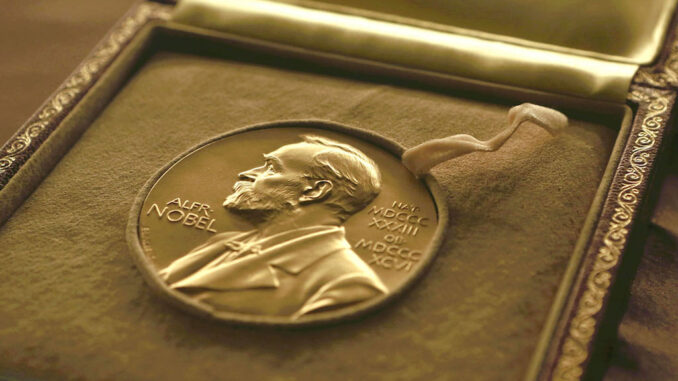
Awarding these writers the Nobel Prize en masse, if not sequentially, is the least that Stockholm can do. For Osundare, Osofisan, Omotoso, Segun and Okediran, the honour will amplify their voices, and those of Soyinka, Shoneyin and Adichie, as a critical mass of harbingers of good over evil anywhere… What’s more: Stockholm would score an admirable grade in gender parity all in one shot. Tokenism is bunk!
For Latin America, the relay baton of the Nobel award in Literature passed rapidly from Gabriela Mistral in 1945 to Miguel Asturias in 1967, to Pablo Neruda in 1971, to Gabriel Garcia Marquez in 1982, to Octavio Paz in 1990 and, more recently, in 2010, to Mario Vargas Llosa. The legendary race these Latin Americans ran past the post teaches that Stockholm needs not resort to tokenism: it has, can and should reward excellence from the same origin when deserving, repeatedly, without giving short shrift to the rest of the world.
Nigeria teems with literary talents bursting at the seams. Wole Soyinka’s recognition in 1987 was apt but, undeniably, Stockholm has waited far too long to similarly honour other Nigerian talents or other writers of Black African descent, who blend unique cultural traditions with iconic universalism. Yes, Toni Morrison’s 1993 win counted. Abdulrazak Gurnah’s 2021 Nobel Laureate status is a worthy nod in the right direction. Still, the overall record falls short of the wholesale acquittal of Stockholm’s slow march. And, the clock ticks; as other worthy talents of sub-Saharan Africa await.
Here, I speak of Emeritus Professor Niyi Osundare who, with his inimitable poetry, prose and plays, paints arresting frescoes depicting the relentless effects of desertification of his native Nigeria’s social and physical landscapes, yet without scrimping on how similar aridity in global policy circles — over the likes of climate change — damages more than the physical environment of the entire human race.
I speak of Professor Femi Osofisan who transforms the ivory-tower theatre into accessible entertainment for unassuming persons in the streets — holding aloft his incandescent light of talent to beam on similarities between Greek and Yoruba mythology — far beyond what even James Joyce’s works accomplish in transplanting Greek gods to his contemporary Dublin.
I speak of Chimamanda Ngozi Adichie whose youthful temerity castigates the constraining hierarchies of gender, race, and class, as well as ethnic-based mediocrity.
I speak of Kole Omotoso, that pioneer of the eclectic genre called FACTION to which even Wole Soyinka has subscribed.
I speak of Mabel Segun’s cosmopolitanism since the colonial days in offerings that range from the autobiographical, like My Father’s Daughter and My Mother’s Daughter, to the fictional, as in Sorry No Vacancy, The Surrender and Other Stories, The Twins and the Tree Spirits, and Friends, Nigerians, Countrymen.
I speak of Dr Wale Okediran whose diverse incarnations as physician, statesman and traveller underpin a prodigious literary output on incisive matters like corruption and terrorism, making him a legendary cause for celebration at a global level, as seen in his recent 2023 EuroAsian Award for outstanding literary productivity at Cairo in Egypt.
And, as the literary entrepreneurship, activism and success of Lola Shoneyin fittingly testify, there are yet more…
If Stockholm casts its net into the wider Diaspora sea of talent, other illustrious and lustrous gems of Black African decent will emerge. Esi Edugyan, a Canadian literary star of Ghanaian ancestry, has distinguished herself with the Scotia Giller Prize twice — first, for Half Blood Blues and, recently, for Washington Black. Similarly, as Poet Laureate, first for Toronto and recently for Canada, AfriCadian George Elliott Clarke makes worthy waves, including forging links between Eastern and Western literary traditions. Not to be outdone, African American Gloria Naylor regals literary palates with sumptuous delights like The Women of Brewster Place and Mama Day.
Awarding these writers the Nobel Prize en masse, if not sequentially, is the least that Stockholm can do. For Osundare, Osofisan, Omotoso, Segun and Okediran, the honour will amplify their voices, and those of Soyinka, Shoneyin and Adichie, as a critical mass of harbingers of good over evil anywhere. Clarke, Edugyan and Naylor may be more emergent but are no less incisive chroniclers of the human condition in the larger diaspora. What’s more: Stockholm would score an admirable grade in gender parity all in one shot. Tokenism is bunk!
END

Be the first to comment